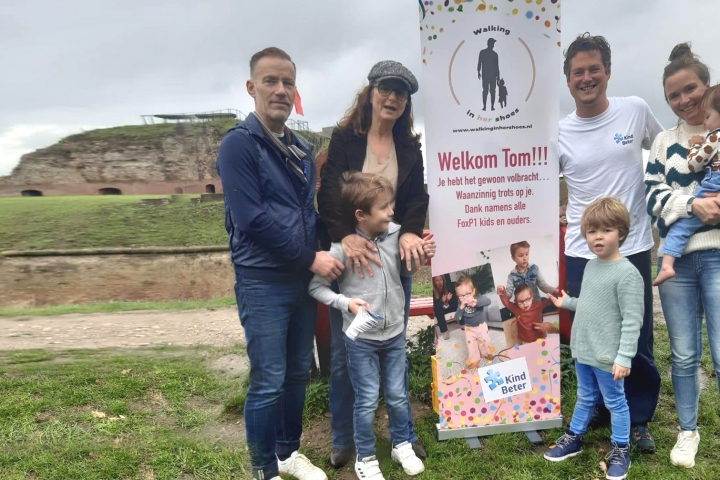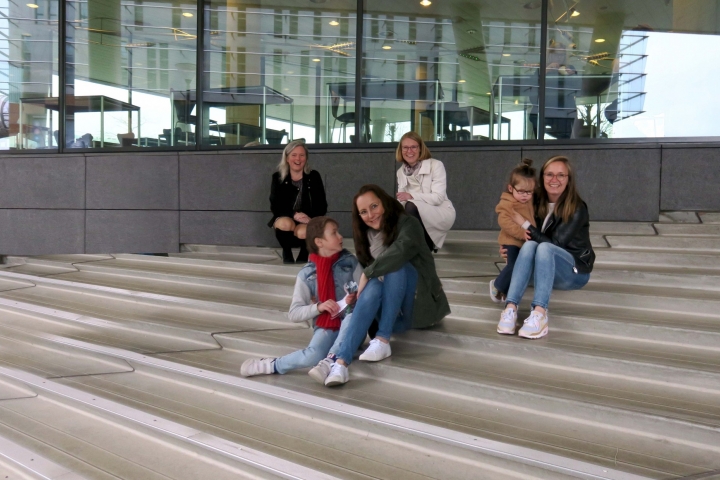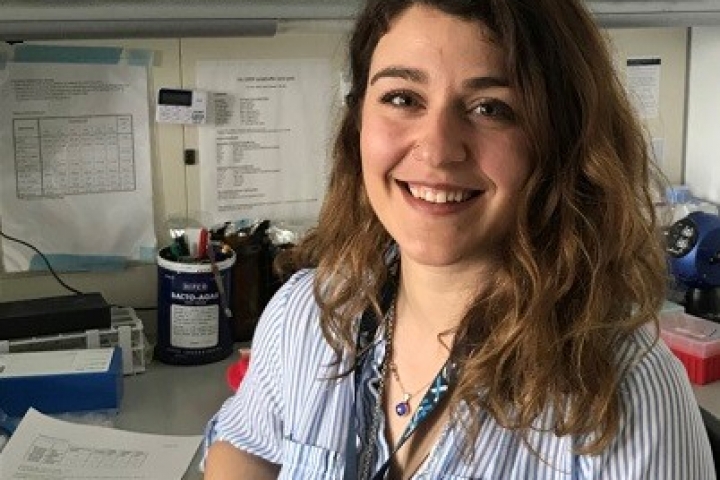Targeted gene therapy for FOXP1
Targeted gene therapy for FOXP1
A deletion or mutation on the FoxP1 gene is a genetic disorder that can occur spontaneously (de novo) as well as be hereditary. An altered protein structure causes a syndrome with different symptoms, which influences the neurological development: This gene generates a wrong protein which causes problems for the whole mental and physical development.
All milestones that come naturally to any other child like walking, talking, reading, and writing are enormously challenging for children and adults with FOXP1 syndrome.
LUMC’s mission is to cure hereditary diseases and genetic abnormalities, such as FOXP1, and has developed a line of research for this.
Internationally there is great interest for this research program. A treatment or cure for the FoxP1 syndrome would mean a significant advancement in finding a treatment or cure for a vast majority of other genetic disorders.
Support the FOXP1 researchWhat does FOXP1 syndrome mean for a patient like Fenn
What does FOXP1 syndrome mean for a patient like Fenn
Meet Fenn!
When Fenn was a baby, we noticed that he startled and became anxious easily. He also didn’t meet any of the normal baby milestones like grabbing toys, making a sound, or rolling over. In fact, none of these milestones were even slightly present. Swallowing was hard for him, and sleeping during the night was a disaster. Overall, things weren’t really developing as they should, but we weren’t worried.
It wasn’t until 8 months when our physician had to refer Fenn to a neurologist because he started developing a strange kind of seizure that completely strained him in which he was unable to make contact and would perspire enormously. This led to a complete medical circus….
After countless checkups with a neurologist, a geneticist, and our physician, we finally got Fenns’ diagnoses around the age of three. “Well, we finally found something”; we were told in a phone call. Fenn had a genetic mutation on the FoxP1 gene.
The only answer they were able to give us when we asked what this means was;
“Developmental delay and mental disability, but we really don’t have any answers, because we simply don’t know much about this rare genetic condition. He just has a little baking error. It could be that he will never walk or talk, but we just don’t know. We wish you all the best and have fun with him.”
That’s it?! And now what? All your dreams and expectations of a normal life are out the window. Days, weeks, months of disbelief, silent grieve, anxiety and searching on the internet followed.
Cancelling the “normal” daycare center and giving up on a normal school were such difficult tasks. Looking into the world of special needs schools and being confronted with all these different special needs children was extremely difficult for us. Was this our future? Every time you say goodbye to a normal life bit by bit.
Every day we see Fenn (now nine years old) struggling and doing his best to participate in all the activities at school and at home that are not always easy for him. Some days his eyes don't work well which makes him anxious and makes him want to hold your hand all the time. Or, he tries to run and falls for the tenth time that day. Nothing comes naturally and everything takes a lot of effort for him. He’s easily overstimulated and has been suffering from irrational fears for a few years now. It’s so special that despite all his struggles, he often has a cheerful smile on his face. But how great would it be if everything was just a little easier for him. Even the smallest chance of a solution means that you would do literally everything as a parent to make this possible.

Genetic Study by Willeke van Roon-Mom, Phd, LUMC
Genetic Study by Willeke van Roon-Mom, Phd, LUMC
There are indications that a possible repair of effects of the FoxP1 syndrome is conceivable.
In this project we want to study how a mutation in the DNA binding domain of FOXP1 can influence the neurological development. We use the ‘Brain-in-a-Dish’ technology where it is possible to create 3D brainorganoids (mini brain).
By creating organoids with and without the FOXP1 mutation, we can study where and when changes in development of the brain occur.
This cell model will be important for further studies on the development of FOXP1 syndrome and the development of therapies.
Exploratory studies will also be done to be able to remove the error in the DNA that causes FOXP1 syndrome with the so-called Adenine Base Editors. These Base Editors is a form of genome editing CRISPR/Cas.
Internationally there is great interest in this research.
The solution for FOXP1 syndrome could have a major impact on a solution for many other genetic mutations.
Many have the same effects on the human system, because of the production of the altered proteins.
Rare diseases rely on private initiatives to work towards a cure. In just over a year, the Kind Beter Foundation has raised more than 90,000 Euros through private initiatives. The Bontius Foundation has decided to make a case for the remaining amount to also make the second year of this research possible.

Video item LUMC
Clinical study by Dr. Saskia Koene
Dr. Saskia Koene, clinical geneticist in training, Leiden Universitair Medisch Centrum (LUMC), started mapping the possibilities and limitations of FOXP1 patients in order to determine how we can help children with FOXP1 syndrome develop in the best way possible.
In collaboration with the USA and Australia a questionnaire is being developed.
In the attached video a short explanation by Dr. Saskia Koene; what is FoxP1 syndrome and what does it mean.
FOXP1 symptoms
FOXP1 symptoms
The severity of the symptoms are different and vary for each patient. Some of them just need some extra help and can lead almost normal lives. Unfortunately, others need 24-hour care and guidance throughout their entire lives.
A deviation on the FoxP1 gene can cause several different symptoms:
- Intellectual disability
- Speech disorder
- Poor fine and gross motor skills development
- Autism or autistic like features
- Strong diminished immune system
- Visual problems
- High Sensitivity
- Anxiety
- Poor concentration skills
- Hyperactivity
Charitable gift from abroad
Charitable gift from abroad
Is your organisation or foundation headed in another country? It is possible to donate with tax deductability or Gift Aid. Please email us by clicking one of the buttons below. The right details will be sent to you immediately.
For more information, please contact Ms. Ambika Lucassen from LUMC Research Foundation +31 (0)71 526 57 49.

Donation as a fund or company
Donation as a fund or company
Would you like more information, or do you have information about how you can co-finance?
Please contact our Relationship Manager Ambika Lucassen of the Bontius Foundation | LUMC Research Foundation via telephone number 071 526 5749 or donate directly using the following account number NL03 INGB 0657 9199 26 stating: FOXP1

News
-

Campaigns for research FOXP1
Since 2019, Stichting Kind Beter (Child Better Foundation) has collected funds through various campaigns to finance research into FoxP1.
Of course, there have been donations from the personal network, several FOXP1 parents have made a contribution, there was a “Vriendenloterij” campaign and a FOXP1 father walked the Pieterpad to collect donations. For more information, see the news page of the Stichting Kind Beter website http://kindbeter.nl/news
-

Donation 77,500 euros from Stichting Kind Beter (Child Better Foundation)
In the past two years, Stichting Kind Beter, founded by the parents of a FOXP1 patient, has collected funds for the start of the research by Dr W. van Roon-Mom of the LUMC. Today the transfer of the amount of no less than 77,500 Euros from Stichting Kind Beter to the Bontius Stchting was made. This amount, in combination with the first starting amount from the Human Genetics Department of the LUMC itself, is sufficient to fund the first year of this research. Stichting Kind Beter: "We are so incredibly grateful to everyone who has helped and contributed! All friends, family, FOXP1 parents, the LUMC, donors, volunteers… The list is so long. But in this way a very big THANK YOU!”
The Bontius Foundation will also start raising funds for the second year. From left to right; Dr. van Roon, Dr. Koene, Pippa and Annemiek, in front Fenn and Esther.
-

dr. Elena Daoutsali starts the research
Dr. Elena Daoutsali officially started the FOXP1 study today, led by Dr. W. van Roon-Mom.
What a milestone to officially start!!! Every 6 weeks there will be an update by the research team to Stichting Kind Beter (Child Better Foundation) and the Bontius Foundation.






